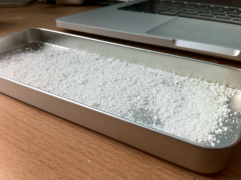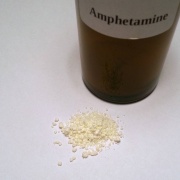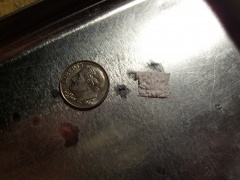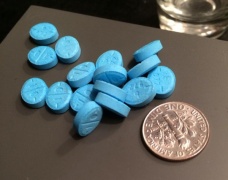Amphetamine
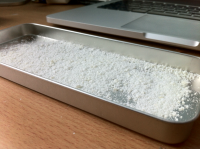
Amphetamine is a CNS stimulant, producing mild euphoria and an abundance of energy. Amphetamines include both the specific chemical 'amphetamine' and the general class of chemicals which share structural similaries. Amphetamines generally cause strong physical and mental stimulation, keeping users awake and alert for many hours, and some amphetamines cause mood lift / euphoria. Because they increase wakefulness, various amphetamines have been used by the military, by pilots, truck drivers, and other workers to keep functioning past their normal limits.
Amphetamine was discovered in 1887 and exists as two enantiomers: levoamphetamine and dextroamphetamine. Amphetamine properly refers to the racemic free base, or equal parts of the enantiomers levoamphetamine and dextroamphetamine in their pure amine forms. Nonetheless, the term is frequently used informally to refer to any combination of the enantiomers, or to either of them alone.
Dosage
Depending on purity, amphetamine doses will vary. Branded amphetamine, like Adderall, knows similar yet better documented and thus more predictable doses.
{{#tdose: amphetamines}}
Duration
Some branded forms of amphetamine like Adderall, generally purposed to be prescribed to treat ADD and ADHD, are extended release (XR), which increases the duration of a single administration.
| Onset | 15-30 minutes |
| Total | 2-4 hours |
| Onset | 1-5 minutes |
| Total | 1-3 hours |
Effects
Positive
- Increased focus
- Abundance of energy
- Increased motivation
Negative
- Racing thoughts
- Reduced appetite
- Flushing of the face
- Increased body temperature
- Tachycardia (Elevated heart rate)
- Hypertension (High blood pressure)
- Peripheral vasoconstriction (Blood vessels get smaller in hands and feet making them susceptible to damage from cold)
- Paranoia
- Irritability
- Insomnia (inability to fall asleep)
After effects
- Hangover
- Afterglow
- Restlessness
- Persisting stimulation (5-15 hours after last dose.)
Harm Reduction
- Avoid driving and operating heavy machinery
- Recommended time (pauses) between using the substance
- Stimulant drugs can cause kidney damage and stroke in users with high blood pressure. If you have been diagnosed or told you have high blood pressure use with caution
See Stimulant Harm Reduction for general information.
Detection Times
- Blood: 12 hours
- Hair: 90 days
- Saliva: 3 days
- Urine: 1-4 days
Images
-
Drying amphetamine paste
-
Amphetamine with vial
-
~50mg of amphetamine
-
Several 10mg Adderall IR pills
Legal status
- Canada: Schedule I
- UK: Class B
- Thailand: Category 1
- United States: Schedule II
